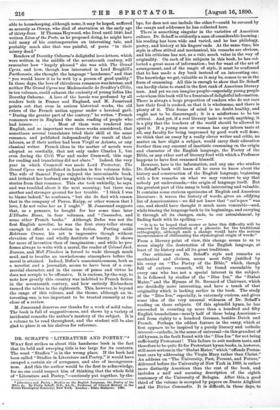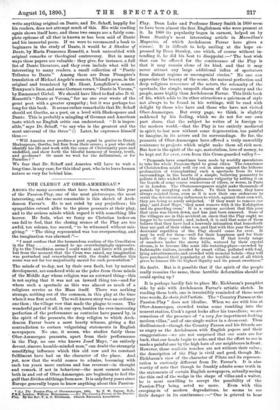DR. SCHAFF'S " LITERAI U ILE AND POETRY."* WHAT first
strikes us about this handsome book is the fact that its bold and sweeping title is too large for its contents. The word " Studies " is in the wrong place. If the book had been called "Studies in Literature and Poetry," it would have escaped a certain air of arrogance, and also of incongruous- ness. And this the author would be the first to acknowledge, for no one could suspect him of thinking that the whole field of " Literature and Poetry,"--curiously put together. by-the- • Literature and Poetry Studies on the English Language, the Poetry of the Bale, Sc. By Philip Schaff, D.D., LL.D., Professor of Church History in the Union Theological Seminary, New York. London : Elkin Mathews. 1890.
bye, for does not one include the other P—could be covered by the essays and addresses he has collected here.
There is something singular in the varieties of American culture. Dr. Schaff is evidently a man of considerable learning : his reading has been wide and varied, and he has philology, poetry, and history at his fingers' ends. At the same time, his style is often stilted and mechanical, his remarks are obvious, and his criticism has not, as a rule, much value in the way of originality. On each of his subjects in this book, he has col- lected a great mass of information ; but for want of the art of arrangement, and of the magic of style, it must be confessed that he has made a dry book instead of an interesting one.
The knowledge we get, valuable as it may be, comes to us in the form of cramming. All this is enough to show that Dr. Schaff can hardly claim to stand in the first rank of American literary men. And yet we can imagine people—especially young people —to whom this book will be a fountain of delightful information.
There is always a large proportion of readers who do not care how their food is cooked, so that it is wholesome, and there is plenty of it. This frame of mind is no doubt healthy, and ought not to be discouraged; it is a misfortune to be too critical. And yet, if a real literary taste is worth anything, it is a pity that the teachers of the world should be allowed to spoil it. If a young man or woman has any inborn taste at all, any faculty for being impressed by good work well done, we think that an essay by a really clever writer and critic, no matter on how slight a subject, would carry their education further than any amount of inartistic cramming on the origin and character of the English language, the Poetry of the Bible, or any ether sort of literary food with which a Professor happens to have first crammed himself.
However, here is the information, and any one who studies Dr. Schaff's book will learn all he cares to know about the history and construction of the English language, beginning with a few remarks on what we may venture to say that nobody yet understands,—the origin of language itself. But the greatest part of this essay is both interesting and valuable.
It contains some curious specimens of English and American literature : it traces the history of words, gives an edifying list of Americanisms—we did not know that " cat's-paw" was one, and should have thought it much more venerable—and, while tracing the language back to its beginnings, and carrying it through all its changes, ends, to our astonishment, by finding fault with its spelling :- " It is to be hoped that sooner or later this difficulty will be removed by the substitution of a phonetic for the traditional orthography, although such a change would have the serious inconvenience of obliterating the etymological origin of words."
From a literary point of view, this change seems to ns to mean simply the destruction of the English language, at least of its history and all its great traditions.
Our criticism on Dr. Schaff's style and remarks as mechanical and obvious, seems most fully justified by his essay on " The Poetry of the Bible," which, though full of curious research, will be found unreadable by every one who has not a special interest in the subject.
It is followed by studies of the "Dies Inn," the " Stabat Mater," and the Hymns of St. Bernard of Clairvaux, which are decidedly more interesting, and have a touch of that originality which is lacking earlier in the book. The study of the " Dies Inn," especially, is extremely curious, and gives some idea of the very unusual wideness of Dr. Schaff's reading on these subjects. Of this splendid hymn, he has
succeeded in counting up more than a hundred and fifty English translations—nearly half of these being American—
and from eighty to a hundred German, besides Dutch and French. Perhaps the oddest feature in the essay, which at first appears to be inspired by a purely literary and catholic interest—catholic, in the sense of universal—in this grandest of old hymns, is the fault found with the "Dies Ira3" for not being sufficiently Protestant ! This failure to suit modern taste, and therefore to be quite fit for Protestant hymn-books, is, however, still more serious in the " Stabat Mater," which "offends Protes- tant ears by addressing the Virgin Mary rather than Christ." An address on " The University, Past, Present, and Future," delivered before the University of New York in 1889, is rather more distinctly American than the rest of the book, and includes a nalf and amusing description of the eighth
centenary of the University of Bologna. After this, a good third of the volume is occupied by papers on Dante Alighieri and the Divina Commedia. It is difficult, in these days, to
write anything original on Dante, and Dr. Schaff, happily for his readers, does not attempt much of this. His wide reading again shows itself here, and these two essays are a fairly com- plete epitome of all that is known or has been said of Dante and his immortal poem. If we were to recommend a book to
beginners in the study of Dante, it would be A Shadow of Dante, by Maria Francesca Rossetti, a book untroubled with
original remarks or theological controversy. But in many ways these papers are valuable : they give, for instance, a full list of Dante literature, and they even include what will be interesting to many readers, a small collection of " Poetic Tributes to Dante." Among these are Dean Plumptre's translation of Michael Angelo's sonnets, Uhland's poem, in the original and translated by Mr. Skeat, Longfellow's sonnet, Tennyson's lines, and some German verses, " Dante in Verona," by Emmanuel Giebel. We should have liked to find also D. G. Rossetti's "Dante at Verona," for no one ever wrote of the great poet with a greater sympathy ; but it was perhaps too long for this book. It seems rather remarkable that Dr. Schaff should set Goethe, as a poet, on a level with Shakespeare and Dante. This is probably a mingling of German and American taste which no English critic can understand. " It is impos- sible," says Dr. Schaff, " to say who is the greatest and the most universal of the three " (!) Later, he expresses himself thus :—
" Will America ever produce a poet equal in genius to Dante, Shakespeare, Goethe, but free from their errors; a poet who shall identify his life and work with the cause of Christianity pure and undefiled, and show forth the blissful harmony of beauty, truth, and goodness ? Or must we wait for the millennium, or for Paradise ?
We fear that Dr. Schaff and America will have to wait a long time, in any case, for this ideal poet, who is to leave human nature so very far behind him.



































 Previous page
Previous page